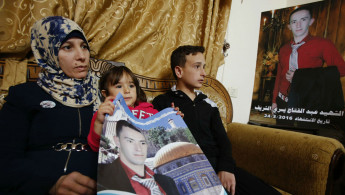Netanyahu compares killer of Palestinian man to fallen soldiers
Israeli Prime Minister Binyamin Netanyahu was forced to apologise for comparing a soldier charged with shooting dead an immobile Palestinian man in the occupied West Bank, to troops killed in combat.
Netanyahu has been criticised for making a call to the father of a soldier standing trial for killing a Palestinian man.
The soldier, Elor Azaria, shot the man in the head as he lay on the ground without posing any apparent threat.
Netanyahu was asked if he regretted the call to Azaria's father, and then appeared to compare the soldier to those killed in fighting.
"Not at all," Netanyahu told Israel's Channel 2 television from New York, where he had attended the United Nations General Assembly, saying he told the soldier's father to trust the military and its judicial system.
Asked if he telephoned other parents of soldiers accused of breaching the army's code of conduct, Netanyahu said "No".
Netanyahu then went on to say that he "called many parents who were in distress after their sons were killed in action or had gone missing, or were killed in action and went missing".
"The citizens of Israel are greatly distressed here," he said of the Azaria case.
The front page of Sunday's Yediot Aharonot, Israel's top-selling newspaper and often hostile to Netanyahu, called it an "infuriating comparison".
Netanyahu then responded to his earlier comments on Sunday.
"I'm sorry if my remarks were misunderstood," Netanyahu wrote on his Facebook page.
"In no way did I intend on comparing between the pain of bereaved families, pain I'm very familiar with, to the condition of other parents in distress," wrote Netanyahu.
Netanyahu's brother Yonatan was killed while commanding a military operation.
"There is no comparison, nor can there be any."
Azaria's case has deeply divided Israeli public opinion, with top military brass condemning his actions and right-wing politicians arguing he has been unfairly treated.
A military court in Jaffa was on Sunday holding a hearing in Azaria's trial, which began in May.
A widely circulated video of the 24 March incident showed Abdul Fatah al-Sharif lying on the ground after stabbing and moderately wounding an Israeli soldier, according to Israeli authorities.
Azaria, who was not at the scene during the alleged attack, then appears in the footage and is seen shooting him in the head without any apparent provocation.





 Follow the Middle East's top stories in English at The New Arab on Google News
Follow the Middle East's top stories in English at The New Arab on Google News
![The UAE is widely suspected of arming the RSF militia [Getty]](/sites/default/files/styles/image_330x185/public/2024-11/GettyImages-472529908.jpg?h=69f2b9d0&itok=Yauw3YTG)
![Netanyahu furiously denounced the ICC [Getty]](/sites/default/files/styles/image_330x185/public/2024-11/GettyImages-2169352575.jpg?h=199d8c1f&itok=-vRiruf5)
![Both Hamas and the Palestinian Authority welcomed the ICC arrest warrants [Getty]](/sites/default/files/styles/image_330x185/public/2024-11/GettyImages-2178351173.jpg?h=199d8c1f&itok=TV858iVg)